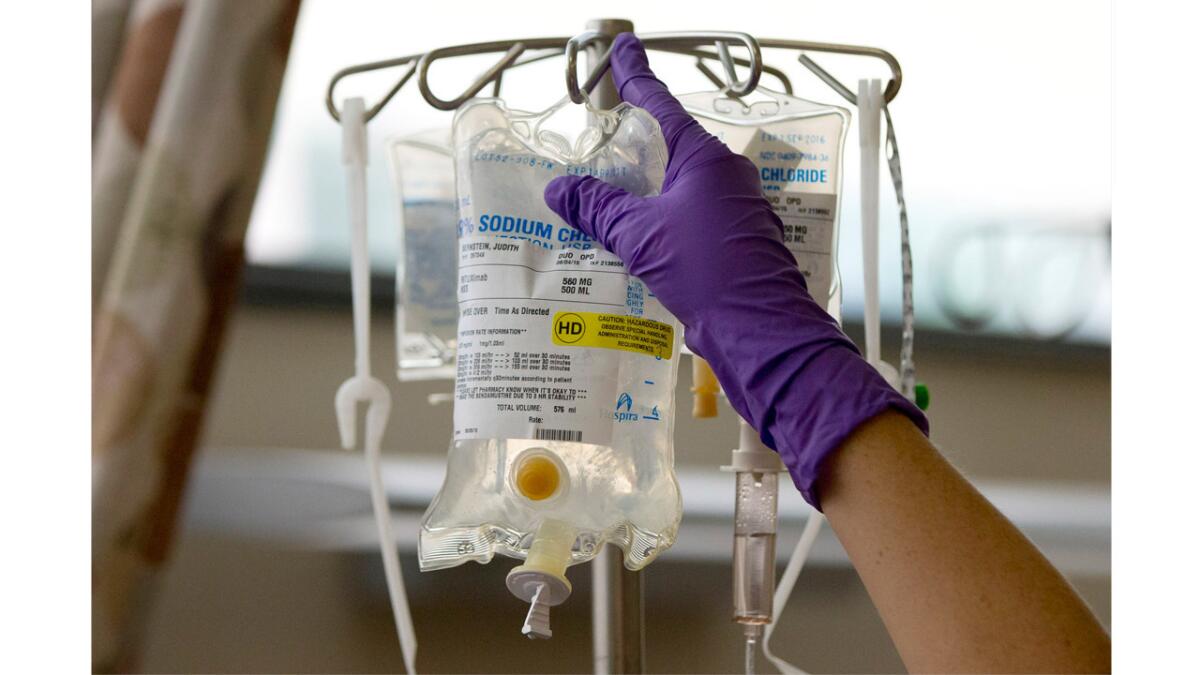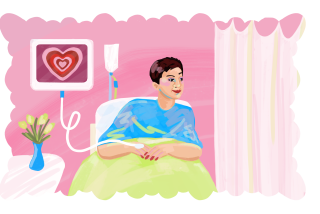A young doctor tries to get comfortable with the Big C

- Share via
She had gone to the emergency department because she had had difficulty taking a deep breath. It wasn’t quite pain that was affecting her breathing, she said. It was discomfort, a feeling that “something was there.”
A CT scan of the chest showed clear lungs. But just underneath, within the tip of her liver, was a mass the size of a ping-pong ball.
We know what’s probably causing your symptoms, the hospital team explained to her as I widened my fingers to show her the size of the mass. But we’re not sure what the mass is.
It could be a walled-off infection. It could be a collection of fluid. Or it could be “something else,” the attending physician said.
I haven’t been a doctor for very long, but I’ve noticed that we tend to shy away from the word “cancer” when another diagnosis is just as likely. A swollen leg can be the result of an infection, a clot or “some other process.” Unrelenting back pain can be a symptom of a pulled muscle, a slipped disc or “something more serious.”
The patient was not alarmed, and we continued to gather data.
Over the next few days, her breathing improved on its own, and she wanted to go home. By this point, we had the results of an MRI, which were inconclusive. We wanted a biopsy. To get a sample of what’s inside your liver for a more definite answer, we said.
Feeling fine, she reluctantly agreed to remain in the hospital. Still feeling fine, she went home after the procedure the next day.
One week later, the results were back. The mass was cancer, and it had come from her colon.
“That’s awful,” my senior resident said when I told her. “Someone has to tell her.”
Someone should tell a lady who feels fine that she has cancer, one that had already become aggressive enough to spread. Once a cancer has metastasized, the prognosis is even worse.
“I’m going to call her now,” I said, then waited for any possible objections.
The resident nodded. “OK, good.”
::
No one walks out of medical school without training on how to deliver bad news. We read papers giving step-by-step protocols on what to ask, what to say, and how to respond. We practice difficult conversations with actors pretending to be patients and debrief afterward. We observe as clinicians have these conversations in in their offices, on the hospital floors and in the ICU.
As I dialed my patient’s number, I looked at the bullet points I had jotted down. I planned to use a well-known protocol.
Assess how much the patient knows about her condition and ask her how much she would like to know. Tell her. Be straightforward and direct. Express empathy and leave room for questions. If the patient is ready, discuss next steps. I knew I wouldn’t be able to answer much about treatment or prognosis, but I was glad that I could direct her to someone who could.
The conversation went quickly. She remembered me. She remembered the biopsy, and she understood why she had it. She wanted to know the results.
I paused.
“You have a tumor in your liver,” I said. “The cells spread from your colon. It is called adenocarcinoma.”
“OK,” she said, in a tone I couldn’t decipher.
“The gastroenterologist knows and would like to see you as soon as possible,” I said. I gave her his phone number. “You can discuss the next steps with him.”
“OK,” she repeated.
“I’m so sorry,” I said. Was she crying? In shock? I broke the silence. “Do you have any questions?”
“Yes,” she said. “Is it cancer?”
::
By the end of medical school, I had gotten cocky when I watched my superiors talk to patients. I was full of critiques best formed by those on the sidelines. Why are you using terms that make the patient’s eyes glaze over? Why aren’t you giving the family enough time to ask questions?
When taken off the sidelines and put into the game, somehow that arrogant former medical student managed to tell a patient she had cancer without using the word “cancer.”
As I hung up the phone, I struggled to remember what had been said to the patient and what had only been discussed behind her back. Certainly the team had spent a good deal of time debating: infection or cancer? We had presented the MRI results at a gathering of doctors from various specialties, asking a radiologist for tip-offs in either direction. We repeatedly asked our patient about other symptoms that could help point to the more likely diagnosis.
I guess we had never explicitly told her why we were asking.
How concerned about cancer does one have to be before burdening the patient with the dreaded word? A 1 in 10 chance that it is? One in 5? One in 2?
Perhaps we had reached that threshold. But it’s exceedingly easy to limit the flow of information.
How many times had I walked into a patient’s room, asked dozens of intimate questions, done an invasive physical exam, and then walked out without giving them more than vague reassurances? “Your infection is getting better.” “Your blood count is stable.” “Maybe you can eat today.”
It’s understandable why this happens, why we take information before we give it. We need time to synthesize our findings, talk to other doctors, come up with a plan to tell the patient.
And we do usually tell the patient. But sometimes it’s 6:30 in the morning while he’s half awake and getting his blood drawn. Other times it’s when her family is visiting and the children are climbing into her bed. Or maybe it’s when his meal tray has just arrived, breaking his 24-hour fast after a procedure.
That phone conversation took place during the first month of my intern year. I’ve made a pact with myself since then. Whenever I go into a patient’s room — no matter how trivial the reason — I will share a piece of information about her care. If I need to listen to her lungs for the fifth time, I’ll tell her if she sounds more or less congested since the last time I’ve listened. If I need the address of the pharmacy where he fills his prescriptions, I’ll tell him which medicines we’ve added to his regimen.
Perhaps this contributes to information overload. But it reminds me that each encounter should go beyond gathering data. It’s also part of an ongoing conversation with the patient who is sharing that data with me.
::
On the last day of my intern year, I sat at a computer screen looking at a number that was much too small. It was my new patient’s blood count, and it was about one-third the amount it should have been.
But he wasn’t actively bleeding. His son had brought him into the emergency department because he had been too weak to get out of bed.
The patient’s extreme weakness was not new. For months his son recognized something was wrong as his father slowly stopped spending time with family and friends, started sleeping more and eating less.
He did not have a regular primary care doctor. His son had taken him to the emergency department once before, where he was found to be in severe kidney failure from dehydration. He had been admitted, treated and discharged.
“They were very focused on his kidneys,” his son recalled. “Something else is wrong.”
“You’re right,” I said. His eyes widened when I gave him the blood count and told him exactly how far it deviated from normal. “This number explains why your father is so weak.”
I looked at the thin man in the bed. “What I can’t explain is what causing this number.”
No. I could be more specific. I knew what I was worried about. But what were the odds? One in 10? One in two?
“There are many reasons someone’s blood count can be low.” To have a low blood count, your body either has to not be making red blood cells, destroying them, or losing them through bleeding.
Start with the low-hanging fruit. Start with something it isn’t.
“For example, if someone drinks a lot of alcohol,” I said.
“He doesn’t,” said the son.
“Sometimes medications can cause it,” I said.
“He’s only on a blood pressure pill,” said the son. I agreed this was an unlikely cause.
Verbalize it. Verbalize your immediate thought when you saw that number on the screen, when you saw that thin man lying in bed.
“It could be something else, something more serious,” I said. “I’m putting this out there, because you’re concerned and I’m concerned too.”
Do not back away.
“Sometimes cancer can do this.”
The words seemed to hang in the air. To ease my own discomfort, I kept talking — probably too quickly — about the workup we would do, about the blood tests and the CT scans we would get. Then I shook the son’s hand and left him, still standing at his father’s bedside.
Several hours later, a CT scan showed a mass in the man’s colon. I went up to his room. After spending 12 hours in the emergency department waiting for a bed, he was finally asleep. His son was gone.
I thought about the urgency in the son’s voice. How he had spent months watching his father grow weaker. How he did not want to be brushed off.
I looked down at the cellphone number I had scribbled on my paper.
My end of the phone conversation was similar to the one I had with my patient nearly one year ago. I was direct. I expressed empathy. I talked about next steps.
But the reception was starkly different. He wasn’t blindsided.
“Do you have any questions?” I asked.
“Yes,” he said. “Can you wait for me to be there tomorrow before you tell my father?”
Absolutely.
Dr. Shara Yurkiewicz is a completing her residency in physical medicine and rehabilitation at Stanford University. She is a former AAAS Mass Media Fellow at the Los Angeles Times.
MORE IN SCIENCE
How to save at least 32,000 lives each year: Replace male doctors with female ones
Optimistic women are less likely to die prematurely of cancer or heart disease, study says






